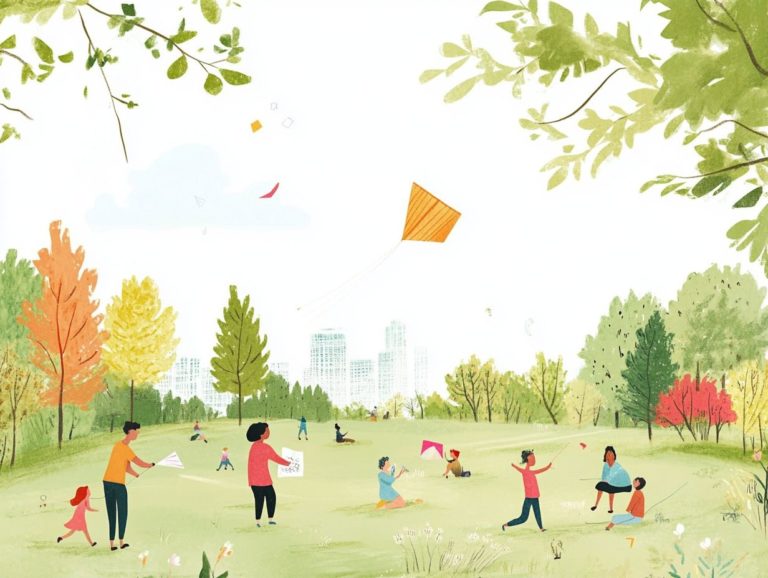5 Mindful Meditation Techniques for Parents
In the whirlwind of mindful parenting, discovering those elusive moments of calm your mind might seem nearly impossible. However, integrating mindfulness meditation into your daily life can serve as a powerful antidote to the stress and anxiety that often accompany this journey.
This article delves into five accessible mindfulness techniques breathing exercises, body scan meditation, gratitude meditation, mantra meditation, and walking meditation that can effortlessly weave into your busy routine as a parent.
We ll also explore how these practices can enhance your relationship with your child, address common challenges, and foster a more peaceful family environment. These techniques can help you manage parenting stress and promote positive parenting.
Uncover the transformative potential of mindful meditation and elevate your parenting experience!
Contents
- Key Takeaways:
- 1. Breathing Exercises
- 2. Body Scan Meditation
- 3. Gratitude Meditation
- 4. Mantra Meditation
- 5. Walking Meditation
- What Is Mindful Meditation and How Can It Benefit Parents?
- How Can Parents Incorporate Mindful Meditation into Their Busy Schedule?
- What Are the Common Challenges Faced by Parents When Practicing Mindful Meditation?
- How Can Mindful Meditation Help with Parenting Stress and Anxiety?
- What Are Some Tips for Practicing Mindful Meditation with Children?
- Frequently Asked Questions
- What are the benefits of practicing mindful meditation for parents?
- What are the 5 mindful meditation techniques for parents?
- How can mindful meditation help busy parents find balance in their lives?
- Can children also benefit from practicing mindful meditation with their parents?
- Do I need to set aside a specific time and place for practicing mindful meditation as a parent?
- How can I incorporate mindful meditation into my daily routine as a busy parent?
Key Takeaways:
1. Breathing Exercises
Breathing exercises are an essential mindfulness technique that enables you to calm your mind and effectively manage parenting stress, offering a sense of tranquility amid the daily chaos. By concentrating on your breath and utilizing various breathing techniques, you can enhance your emotional regulation, cultivate self-compassion, and improve your overall mental health. This focus on breath is a foundational element of mindfulness.
Among these techniques, deep breathing stands out as particularly advantageous. It encourages you to take deeper, slower breaths, promoting relaxation and reducing the production of stress hormones. You might also explore alternate nostril breathing, which harmonizes your body s energies and can usher in a profound sense of peace, aiding in stress reduction.
To seamlessly weave these practices into your daily routine, consider dedicating a few minutes each morning or evening to mindful breathing. You could even practice together with your children during moments of calm. Using reminders like ambient sounds or visual cues around your home can help prompt you to engage in these restorative exercises, transforming mindfulness into a cherished family activity. Employing these breathing techniques can also help improve your overall stress management and emotional well-being.
2. Body Scan Meditation
Body scan meditation is a transformative mindfulness technique that invites you to cultivate awareness of your physical sensations, significantly enhancing your emotional well-being and reducing stress. This practice, often recommended by experts like Shonda Moralis, allows you to connect deeply with your body, pinpoint areas of tension, and promote relaxation through attentive observation.
By systematically focusing on different parts of your body, from the tips of your toes to the crown of your head, you can develop a richer sense of presence and a better understanding of your physical state. This heightened awareness not only helps you recognize stressors but also enables you to manage your emotional responses with greater effectiveness, serving as a valuable coping technique.
Engaging in this practice offers a much-needed refuge from the chaos of daily life, providing you with a moment for introspection and self-care. As you embrace this mindful approach, you can experience increased clarity, ultimately fostering a more balanced and harmonious home environment. This mindfulness technique is an effective tool for stress management.
By regularly incorporating body scan meditation into your routine, you’ll reap long-lasting benefits in emotional regulation and resilience against stress.
3. Gratitude Meditation
Gratitude meditation is a way to practice mindfulness that can change your perspective, enabling you to foster positive parenting by reflecting on and appreciating the joys of your daily life. This practice cultivates gratitude and enhances your emotional well-being and mental health while deepening your connection with your child and the world around you.
Incorporating specific techniques can elevate your reflections to new heights. Try these prompts to spark your gratitude:
- Journaling
- Guided visualization (guided visualization means imagining positive scenarios with the help of a voice or recording)
For example, setting aside just a few minutes each day to jot down three things for which you are thankful whether it’s a warm smile from your child or a serene moment during bedtime can remarkably shift your perspective.
Use prompts like, “What small moments brought me joy today?” or “How did my child express love to me this week?” These simple questions can help cultivate a habit of recognition. Engaging in gratitude practices enhances your mental health by reducing stress and increasing overall happiness. It creates a nurturing and supportive atmosphere that benefits both you and your children. Recommendations from experts like Shonda Moralis can also provide valuable insights into developing these practices.
Step into gratitude today and transform your parenting journey!
4. Mantra Meditation

Mantra meditation is a profoundly effective mindfulness technique that uses the repetition of specific phrases or words to sharpen your focus and enhance emotional regulation. This practice is invaluable for parents navigating the tumultuous waters of stress and anxiety, especially when dealing with their child’s feelings and developmental milestones.
By fostering self-compassion and heightened awareness, mantra meditation can transform negative emotions into enabling affirmations, ultimately leading to improved mental health. This mindfulness technique also aids in managing attention-deficit/hyperactivity disorder symptoms in both parents and children.
You can explore a variety of mantras that resonate with your unique experiences or even craft your own phrases that encapsulate your aspirations and values. Simple yet powerful phrases like “I am calm” or “I nurture with love” serve as effective anchors during moments of overwhelm.
Regular practice cultivates resilience, equipping you with the tools needed to face daily parenting challenges with renewed ease. Research indicates that adopting this meditative approach significantly reduces anxiety levels, enhances mood, and fosters a more positive perspective on parenting, creating a nurturing atmosphere for both you and your children. Tools like the Calm app can assist in maintaining consistency in your meditation practice.
Start your mantra journey today and watch as your emotional landscape transforms!
5. Walking Meditation
Walking meditation offers a unique blend of physical movement and mindfulness practices, allowing you to immerse yourself in the present moment through the simple sensations of walking. This technique helps you focus on your breathing and the physical feelings passing through your body, fostering a deeper connection between your mind and body while effectively reducing stress.
To begin this enriching practice, seek out a quiet space where you can walk safely and without distractions. Start by standing still for a moment, taking deep breaths, and setting a clear intention for your session. This awareness practice helps you develop a more mindful approach to daily activities.
As you start to walk, be fully aware of each step, tuning into the ground beneath your feet and the rhythm of your breath. Embrace the sights, sounds, and scents surrounding you, allowing them to ground you in the moment.
For busy parents, integrating walking meditation into your daily routine whether during a lunch break or while waiting for your children will transform your stress into calm and cultivate a sense of peace amid your bustling schedule. This technique, often highlighted by experts such as Sri K. Pattabhi Jois, is a valuable tool in your stress reduction arsenal.
Take a step outside today and feel the stress melt away as you walk mindfully!
What Is Mindful Meditation and How Can It Benefit Parents?
Mindful meditation helps you become aware of your thoughts, feelings, and body sensations, especially as you deal with the stress of parenting. By enhancing your emotional well-being through techniques like breath focus and self-compassion, you can develop coping strategies that foster greater empathy and compassion for both yourself and your children. Utilizing resources like the Calm app can help maintain consistency in your practice.
Rooted in ancient Buddhist traditions, mindful meditation has seamlessly transitioned into a secular practice adopted by many cultures in their quest for peace and clarity. You might explore various techniques, including guided meditations, body scans, or mindful walking, each designed to deepen your connection to the present moment. Experts like Sri K. Pattabhi Jois and resources such as Workman publishing provide valuable insights into these practices.
As a parent, the benefits are truly profound. Improved emotional regulation allows you to respond calmly to your children’s needs, significantly reducing those frustrating outbursts. With better stress management, you create a healthier home environment that enhances communication and nurtures a robust bond in your parent-child relationship. Incorporating mindfulness meditation can also improve your ability to practice active listening, further strengthening your connection with your child.
This approach makes your parenting journey manageable and deeply fulfilling. Engaging with platforms like Zero to Three can offer additional support and resources for mindful parenting.
How Can Parents Incorporate Mindful Meditation into Their Busy Schedule?
Incorporating mindful meditation into your bustling parenting schedule is entirely achievable through techniques like five-minute mindfulness, allowing you to carve out brief moments of tranquility amid the chaos of your day. By dedicating even a short span to mindfulness practices, you can greatly boost your emotional well-being and manage parenting stress with greater ease. This approach to five-minute mindfulness can be particularly effective for busy parents.
To get started, consider allocating specific times during your day perhaps while waiting for your child’s school bus or during your lunch break to engage in simple meditative exercises. Techniques such as deep breathing or guided imagery, easily accessible through smartphone apps, are particularly effective during these brief windows. Resources from Amazon or B&N offer further guidance on meditation practices.
Setting a reminder on your device to check in with your feelings can help keep you accountable. The secret lies in consistency; by weaving these mindful moments into your daily routine, your overall mental health can thrive, fostering greater patience and clarity as you navigate the beautiful challenges of parenthood, a concept often highlighted by experts like Shonda Moralis.
What Are the Common Challenges Faced by Parents When Practicing Mindful Meditation?

Parents often face familiar challenges when diving into mindful meditation. These include carving out time, managing distractions, and dealing with negative feelings and parenting stress. Addressing these hurdles is crucial for improving emotional wellbeing.
To effectively overcome these obstacles, view mindfulness as an evolving practice rather than just another task on your to-do list. Creating a dedicated space for quiet reflection, even for just a few minutes each day, significantly enhances your focus.
Imagine practicing deep breathing while cooking transforming a daily chore into a mindful moment! You can also take a moment to reflect on gratitude during family outings to help lower stress levels.
Acknowledge both positive and negative feelings to strengthen your ability to cope with various emotional states. Validating your feelings without judgment nurtures a compassionate inner dialogue. Ultimately, the journey toward mindfulness focuses on progress and adaptability. Be patient with yourself as you foster a more serene and connected family environment.
How Can Mindful Meditation Help with Parenting Stress and Anxiety?
Mindful meditation provides effective tools to navigate the challenges of parenting stress and anxiety, paving the way for emotional well-being. Techniques that elevate self-awareness and emotional regulation can help you respond to stressors with poise and tranquility.
Practices like focused breathing, body scans, and guided imagery can dramatically reduce feelings of overwhelm and cultivate inner peace. These techniques help you stay present during trying times and demonstrate emotional resilience to your children.
Establishing a consistent mindfulness routine perhaps just a few minutes each day can usher in profound changes in your perspective and actions. Many parents discover that this practice nurtures patience and empathy, essential qualities for sustaining healthy relationships with their children. This ultimately nurtures a warm and supportive home atmosphere.
Books such as Five-Minute Mindfulness, available at Amazon and B&N, can offer practical tips for integrating these practices into a busy schedule.
What Are Some Tips for Practicing Mindful Meditation with Children?
Practicing mindful meditation with children can be an incredibly rewarding journey, enhancing their emotional regulation skills and teaching valuable coping techniques for managing stress. By engaging in simple mindfulness exercises together, you cultivate a sense of calm and connection while instilling essential lessons in empathy and compassion.
The Calm app can be a useful tool for guiding these exercises, making the practice more accessible for both parents and children. This shared practice nurtures a supportive environment and lays the groundwork for building resilience in young minds.
Introduce age-appropriate techniques like breathing exercises, where your children can count their breaths or visualize blowing bubbles, promoting focus and relaxation.
Storytelling mindfulness is another excellent approach. Reading calming tales followed by reflective discussions can be particularly effective for younger children. As they mature, incorporate more complex practices like yoga or nature walks to deepen their connection with themselves and the world around them.
Ashtanga yoga, a structured series of postures, helps improve focus and flexibility, can be particularly effective in this journey.
The benefits of these shared mindfulness experiences ripple out to both you and your child, creating a loving space for bonding, enhancing mental health, and fostering an appreciation for the present moment.
How Can Mindful Meditation Help Improve the Parent-Child Relationship?
Mindful meditation has the remarkable ability to enhance your relationship with your child. It helps you understand and care for your child better.
This practice enables you to be more present and attuned to your child s feelings and needs. As you embrace mindfulness, you elevate your emotional well-being.
Moreover, you create a supportive environment that fosters open communication and mutual understanding. Research indicates that parents who practice mindful meditation often experience increased patience and reduced stress.
This naturally leads to more positive interactions with their children. Families share testimonials about how mindfulness has played a pivotal role in de-escalating conflicts and building trust.
The result is stronger, deeper bonds between parents and children. To further strengthen this invaluable connection, consider practicing mindfulness alongside your child.
Engage in simple techniques like mindful breathing or taking nature walks. During these activities, you can both focus on your surroundings.
These fun activities will transform your experiences together. By modeling mindfulness, you cultivate an atmosphere of awareness and emotional safety that benefits the entire family.
Frequently Asked Questions

What are the benefits of practicing mindful meditation for parents?
Practicing mindful meditation can help parents reduce stress and increase patience. It can also enhance empathy, improve sleep quality, and boost overall well-being.
What are the 5 mindful meditation techniques for parents?
The 5 mindful meditation techniques for parents include breath awareness, body scan, loving-kindness meditation, mindful walking, and gratitude meditation.
How can mindful meditation help busy parents find balance in their lives?
Mindful meditation can help busy parents find balance by promoting self-awareness. It reduces negative thoughts and increases the ability to be present in the moment.
Can children also benefit from practicing mindful meditation with their parents?
Yes, children can benefit from practicing mindful meditation with their parents. It helps them develop important life skills such as self-awareness, empathy, and emotional regulation.
Do I need to set aside a specific time and place for practicing mindful meditation as a parent?
It is recommended to set aside a specific time and place for practicing mindful meditation. However, it can also be incorporated into daily activities like cooking or playing with your children.
How can I incorporate mindful meditation into my daily routine as a busy parent?
You can incorporate mindful meditation into your daily routine by starting with just a few minutes each day. Set reminders and find moments throughout the day to practice mindfulness.







